
Louis IV, called the Bavarian, of the house of Wittelsbach, was King of the Romans from 1314, King of Italy from 1327, and Holy Roman Emperor from 1328.
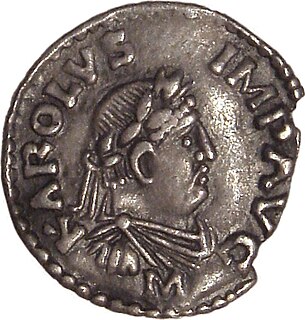
The Holy Roman Emperor, originally and officially the Emperor of the Romans during the middle ages, and also known as the German-Roman Emperor since the early modern period, was the supreme head of state and ruler of the Holy Roman Empire. The Empire was considered by the Roman Catholic Church to be the only legal successor of the Roman Empire during the Middle Ages and the early modern period. The title was held in conjunction with the title of King of Italy from the 8th to the 16th century, and, almost without interruption, with the title of King of Germany throughout the 12th to 18th centuries.

Adolf was Count of Nassau from about 1276 and elected King of the Romans from 1292 until his deposition by the prince-electors in 1298. He was never crowned by the Pope, which would have secured him the title of Holy Roman Emperor. He was the first physically and mentally healthy ruler of the Holy Roman Empire ever to be deposed without a papal excommunication. Adolf died shortly afterwards in the Battle of Göllheim fighting against his successor Albert of Habsburg.

Frederick the Fair or the Handsome, from the House of Habsburg, was the duke of Austria and Styria from 1308 as well as the anti-king of Germany from 1314 until 1325 and then co-king until his death.
The imperial ban was a form of outlawry in the Holy Roman Empire. At different times, it could be declared by the Holy Roman Emperor, by the Imperial Diet, or by courts like the League of the Holy Court (Vehmgericht) or the Reichskammergericht.
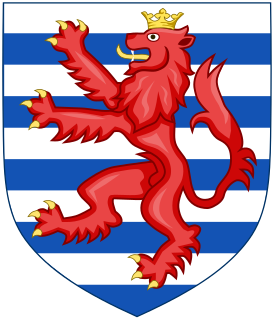
The Limburg-Luxemburg dynasty, one of several families from different periods known as the Luxembourg dynasty was a royal family of the Holy Roman Empire in the Late Middle Ages, whose members between 1308 and 1437 ruled as kings of Germany and Holy Roman emperors as well as kings of Bohemia and Hungary. Their rule was twice interrupted by the rival House of Wittelsbach.
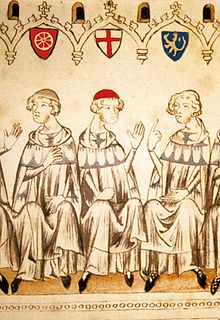
Rudolf I of Bavaria, called "the Stammerer", a member of the Wittelsbach dynasty, was Duke of Upper Bavaria and Count Palatine of the Rhine from 1294 until 1317.

The Declaration of Rhens or Treaty of Rhens was a decree or Kurverein of the Prince-electors of the Holy Roman Empire issued in 1338 and initiated by Baldwin of Luxembourg, the Archbishop of Trier and brother of the late Emperor Henry VII.

Peter of Aspelt was Archbishop of Mainz from 1306 to 1320, and an influential political figure of the period. He brought the archbishopric to its peak of power.
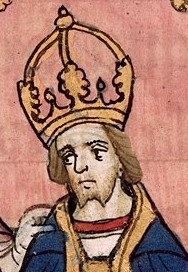
Henry VII was the King of Germany from 1308 and Holy Roman Emperor from 1312. He was the first emperor of the House of Luxembourg. During his brief career he reinvigorated the imperial cause in Italy, which was racked with the partisan struggles between the divided Guelf and Ghibelline factions, and inspired the praise of Dino Compagni and Dante Alighieri. He was the first emperor since the death of Frederick II in 1250, ending the Great Interregnum of the Holy Roman Empire; however, his premature death threatened to undo his life's work. His son, John of Bohemia, failed to be elected as his successor, and there was briefly another anti-king, Frederick the Fair contesting the rule of Louis IV.
Rudolf I, a member of the House of Ascania, was Duke of Saxe-Wittenberg from 1298 until his death. By the Golden Bull of 1356 he was acknowledged as Elector of Saxony and Marshal of the Holy Roman Empire.
The imperial election of May 22, 1400 was an imperial election held to select the emperor of the Holy Roman Empire. It took place in Frankfurt.
The imperial election of 1411 was an imperial election held to select the emperor of the Holy Roman Empire. It took place on July 21.
The imperial election of 1440 was an imperial election held to select the emperor of the Holy Roman Empire. It took place in Frankfurt on February 2.
The imperial election of 1619 was an imperial election held to select the emperor of the Holy Roman Empire. It took place in Frankfurt on August 28.
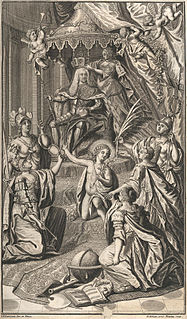
The imperial election of 1742 was an imperial election held to select the emperor of the Holy Roman Empire. It took place in Frankfurt on January 24. The result was the election of Charles Albert of Bavaria, the first non-Habsburg emperor in hundreds of years.

The imperial election of 1273 was an imperial election held to select the emperor of the Holy Roman Empire. It took place in Frankfurt on October 1.
The imperial election of 1292 was an imperial election held to select the emperor of the Holy Roman Empire. It took place in Frankfurt on May 5. Emperor Rudolf I of Germany had died on 15 July 1291.

The imperial election of October 20, 1314 was an imperial election held to select the emperor of the Holy Roman Empire. It took place in Frankfurt.












